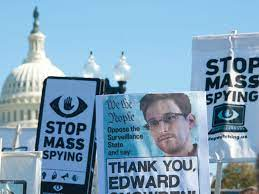Introduction
In a time where technology has taken over, privacy rights are being violated, and governments are increasingly building a wall around us with continuous surveillance, it’s an epoch where privacy is almost dead. In an intricate analysis detailing the tangled web between tech titans and government spying apparatus, this essay uses the examples of Julian Assange and Edward Snowden to provide insightful case discussions. With tech giants like Google, Facebook, Apple, and Amazon having so much presence now in everyday lives, it enabled the gathering and saving of information of a person and makes the spread even more extensive than before. Meanwhile, governments around the globe have tapped into these massive stores of data to increase their surveillance, invoking the need for national security and policing. And within this intersection of priorities, issues of personal privacy and civil rights are hotly debated. Assange revealed international-scale state secrets by leaking classified documentation; Snowden revealed just how invasive governmental surveillance programs were behind closed doors. Such an examination is crucial given the complex relationship between technology platforms, governmental bodies and serious consequences for an individual’s right to privacy. This study explores the nuances that exist, analyzes in depth the ethics, legality, and morality involved, and offers insights into the risk/reward relationship of security and personal privacy.
Case Study: Julian Assange
Julian Assange, an Australian activist and journalist, founded the group in 2006 to make governments more transparent and responsible by publishing top-secret materials. Assange released humiliating US log data and diplomatic communications from the Iraq and Afghanistan conflicts. He revealed sensitive government projects, sparking global openness and whistleblowing talks. Assange’s publication of secret papers made him controversial. Defenders argued he was protecting free speech and openness, while opponents said he was reckless and endangering national security. His disclosure of hundreds of thousands of papers about himself and WikiLeaks, his seven-year sanctuary at the Ecuadorian Embassy in London, and his 2016 arrest reignited arguments (Webb, 2020).
Fig 1. Publication leaks on the ills surrounding the Afghanistan war

Source: (Whittaker, 2018)
WikiLeaks used Amazon Web Services for hosting. In 2010, AWS removed WikiLeaks’ hosting due to political pressure and legal concerns. The judgment raised worries about how substantial technology corporations may limit information access, NBC reported. Payment processors, including PayPal, Visa, and Mastercard, blocked WikiLeaks from receiving contributions. This economic and digital extortion has weakened the organization and raised concerns about corporate censorship and free expression. Domain registrars, or DNS hosters, also participated, with some just not renewing WikiLeaks domains and others more forcefully (Webb, 2020). They cut links with the group, making its site harder to access. The Julian Assange privacy rights matter is crucial legally and ethically. Assange’s actions exposed government corruption and raised questions about openness and accountability. This is compatible with democratic principles like free speech and press. His US arrest and deportation illustrate the conflict between national security and openness.
Case Study: Edward Snowden
Edward Snowden, a former NSA contractor, unfurled an extensive and covert web of surveillance shrouded in secrecy. Edward Snowden, the information divulger, disseminated a plethora of classified documents to the media, thus illuminating the existence of the PRISM and XKeyscore surveillance behemoths (Adzanas & Ipto, 2022). These concerted endeavors endowed the National Security Agency (NSA) with the prowess to amass and dissect copious volumes of electronic communication data emanating from both the residents of the United States and foreign territories. This encompassed the sweeping compendium of communication metadata, electronic messages, and internet browsing history, all bared by the audacious Snowden.
Fig 2. Banners hailing Snowden for unveiling unethical spying by the government.

Source: (Hesseldahl, 2015)
The narrative also meanders into the labyrinthine landscape of technology titans, namely Google, Facebook, Microsoft, and Apple, who, according to purloined documentation, forged symbiotic alliances with governmental entities. This symbiosis conferred upon them the ability to access user data reminiscent of the PRISM modus operandi. These revelations sowed the seeds of trepidation concerning widescale surveillance by tech behemoths, coupled with apprehensions that law enforcement agencies might be tapping into the user data wellspring. In the wake of Snowden’s revelatory disclosures in 2013, numerous tech conglomerates, including the very PRISM, went to great lengths to extricate themselves from the entanglements of governmental surveillance (Adzanas & Ipto, 2022). The ensuing fallout of Edward Snowden’s disclosures gave birth to the USA Freedom Act.
Privacy Advocacy and Legislation
Privacy organizations and civil liberty non-governmental organizations try to raise awareness of the public danger of privacy in the digital world and the data practices of big tech corporations. They collaborate with policymakers and regulators for better privacy regulation and more transparency of tech firms. Non-profit private NGOs such as the Electronic Frontier Foundation (EFF) and the American Civil Liberties Union (ACLU) sue technology firms and governments on the grounds of breaching privacy rights through unlawful surveillance and data-processing practices. Customers now have more say over their information thanks to the EU’s General Data Protection Regulation (GDPR) (Klar, 2020). There is express consent needed for data processing, stricter data breach requirements, and the right of erasure over data. As per the California Consumer Privacy Act (CCPA), Californian users can now request more details about which data is collected and sold, as well as exercise their right to opt-out from selling their data. With the implementation of the GDPR and CCPA, tech firms were pushed towards better data protection practices, as well as giving individuals more control over the data they collect.
Future Trends and Implications
Tech companies might come under greater pressure from users, lawmakers, and advocacy groups as people become increasingly aware of their privacy rights and surveillance practices. This might give rise to greater calls for transparency and accountability from government-facing institutions. A drive to adopt worldwide privacy regulation, such as GDPR, will pick up steam. How tech giants treat government demands for data could be affected if they are forced into greater conformity with consistent privacy rules. Tech firms will keep refining privacy and encryption measures to secure user data going forward. This would make it harder for governmental entities to obtain user data. But tech firms could be involved in more battles with governments over their access to data, such as Apple’s confrontation with the FBI. It could establish new legal standards in privacy and surveillance. The amount of data these AI-powered surveillance technologies are capable of processing raises concern over mass surveillance abilities. Using AI for surveillance could soon become the norm for Governments (Feldstein, 2019). Encryption will continue to strengthen and protect how users are able to communicate with one another so the government cannot easily intercept or decrypt messages. Privacy-preserving AI methodologies may permit examination of the information while not unveiling the client’s personal information, providing some balance between protection and examination. As artificial intelligence is increasingly utilized for surveillance, questions can arise surrounding algorithmic bias and disparities within disenfranchised populations.
Conclusion
Interaction between tech giants, government surveillance, and privacy rights was becoming a hallmark of modern-day society. This research has revealed the complex ecosystem of interconnections, moral challenges, and changing power dynamics in this space through examples such as Julian Assange and Edward Snowden. Significant discoveries show that technology behemoths, pervasive throughout our lives, have significant control over collecting and disseminating personal information. National security and law-enforcement goals meet up with those same tech giants in government surveillance apparatuses, prompting privacy-rights concerns. The tensions between asylum and extradition in the cases of Assange and Snowden illustrate how these dynamics play out. Tech companies find themselves in between a rock and a hard place when it comes to government requests. They often cooperate with them but also push back when it is in the interest of user privacy. Protecting civil liberties is no less challenging than ever as technology continues to change. The ethical implications of this symbiosis must be carefully considered, while novel technologies such as AI and encryption add an extra layer of intricacies.
References
Adzanas, A., & Ipto, B., (2022). Edward Snowden” S Communication Strategy Against Information Domination Government of the United States. DIA: Jurnal Administrasi Publik, 20(01), 121-135. https://jurnal.untag-sby.ac.id/index.php/dia/article/download/6295/4703
Feldstein, S., (2019). The global expansion of AI surveillance (Vol. 17). Washington, DC: Carnegie Endowment for International Peace. https://blog.fdik.org/2019-09/WP-Feldstein-AISurveillance_final1.pdf
Klar, M., (2020). Binding effects of the European general data protection regulation (gdpr) on US companies. Hastings Sci. & Tech. LJ, pp. 11, 101. https://repository.uclawsf.edu/cgi/viewcontent.cgi?article=1095&context=hastings_science_technology_law_journal
Hesseldahl, A., (2015, March 16). Snowden leaks have changed how Americans see their privacy. Vox. https://www.vox.com/2015/3/16/11560290/snowden-leaks-have-changed-how-americans-see-their-privacy
Webb, M., (2020). Coding democracy: How hackers are disrupting power, surveillance, and authoritarianism. MIT Press. https://books.google.com/books?hl=en&lr=&id=uajRDwAAQBAJ&oi=fnd&pg=PR7&dq=His+disclosure+of+hundreds+of+thousands+of+papers+about+himself+and+WikiLeaks,+his+seven-year+sanctuary+at+the+Ecuadorian+Embassy+in+London,&ots=87pYER0r20&sig=VFhkdfcupKQGVz4BywWLt3xGBrA
Whittaker, F., (2018, April 30). What Is WikiLeaks? Everything you need to know. NBC News. https://www.nbcnews.com/storyline/smart-facts/what-wikileaks-everything-you-need-know-n869556